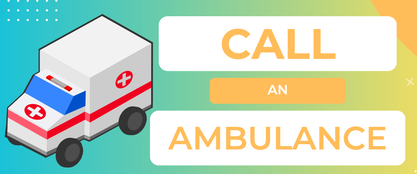|
Prevent Emergencies, Duh
First, of course, it’s best to prevent emergencies. Entire books have been written on this topic. For the purposes of this blog, you should be prepared. Get a first aid kit and learn how to use it. Do a risk assessment of your home environment (and people) and figure out where the dangers are. Additionally, learning how to perform certain life saving procedures, like CPR and the Abdominal Thrusts Maneuver, can be crucial in sudden life or death situations where an immediate response is necessary. Get Ready But when you need to call an ambulance, there are several measures you can take prior to picking up the phone to make it easier for the ambulance (or emergency services) to assist you. Melissa Sawyer, Communications Specialist with Northwell Health Center for Emergency Medical Services, states that making sure your home can be found is one of the best ways to help the ambulance get the patient to the hospital quickly, safely, and securely. The first thing you must be able to share is the location of the emergency. One needs to be able to describe how to get the responders to where the emergency is. That may include an address, gate code, location inside of a structure etc. Many emergencies occur outside the home; always know where you are so you can request help accurately. Make sure that your house and the house numbers are clearly visible from the outside, unobstructed by bushes, trees, or any other physical barriers. If you are inside of a house or building with any flashlights, porch lights, or any items that emit powerful light, place them outside of your house to make sure that the ambulance can see your building address number. Additionally, hiding a key in front of your house can be very beneficial, since you can inform emergency responders over the phone of its location to let them gain entry to your home in the event you’re hurt inside your home. Share Good Information It’s important to remain calm and convey good information to emergency dispatchers when you call an ambulance. When the responders arrive, there are many tips to help ensure paramedics are able to do their job as efficiently and safely as possible. Important information includes:
You always want to make sure that you know any urgent information about the patient’s state, especially if they are unable to speak or are unresponsive, in order to quickly provide the responders with as much information as possible. Being able to relay to the medical professionals where the patient was and what they were doing in the moments prior to the incident, what the patient is experiencing, and whether or not this issue has happened before are all important for paramedics to know. Do your best to convey as much of the patient’s personal information, medical history, and medication names and dosages as possible. (Not to mention any known allergies.) This will allow the paramedics and emergency room staff to treat the patient without risking allergic reactions or prescribing treatment that cannot be mixed with medications that the patient is already taking. Call An Ambulance! Additionally, when you call an ambulance it’s crucial to watch for the incoming ambulance, and if possible, have someone stay near the street close to your location so they can direct the ambulance to the right house. Make sure there are no obstructions or obstacles blocking the paramedics from getting to your location, including cars, furniture, patio items, as well as dogs, cats, or other large animals. An emergency situation is no joke. While knowing to call 911 in a dire event is crucial, remembering these tips can make the difference between simply calling for help and getting the proper help for your loved one as efficiently as can be.
0 Comments
|


 RSS Feed
RSS Feed
